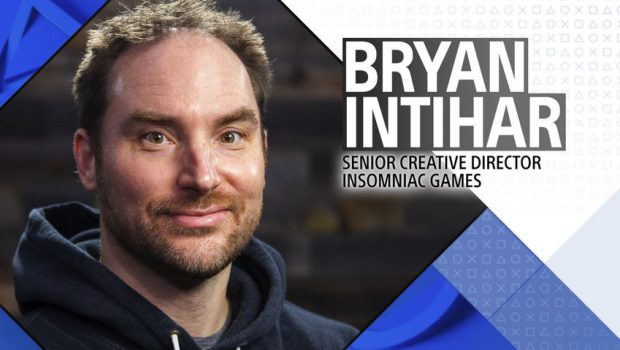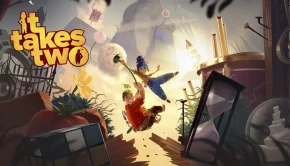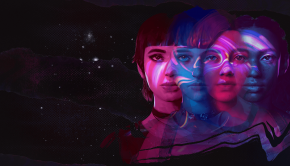Leadership Spotlight: Bryan Intihar, Senior Creative Director at Insomniac Games
Sony Interactive Entertainment (SIE) is proud to be a place with a culmination of hundreds of multifaceted, talented individuals. When they are assembled and given the right leadership to foster creativity and growth, the combined effort can result in amazing experiences for our player community.
Bryan Intihar, Senior Creative Director at Insomniac Games, describes his role as motivating his teams towards a shared creative vision and using decisive action to string multiple ideas into truly spectacular games. As an “Insomniac” for over fifteen years, Bryan has led a dynamically talented team with acclaimed hits including Marvel’s Spider-Man (2018) and the most recent Marvel’s Spider-Man 2.
SIE had an opportunity to discuss the studio’s high-profile launch where Bryan found himself the subject rather than the storyteller, as he shared the tangible and intangible values of interpersonality, authenticity, and support on the individual level.
Weaving Everything Together
What is a Creative Director? The answer varies depending on the respective teams they’re on, but they share common threads. For Bryan, his primary goal is to outline the creative vision for the team that symbolises a common goal that unites and inspires the development teams. “We have to present a vision that people believe in, one that they’re going to wake up and want to work on.” He elaborates, “Then, my job is to empower them to take that idea and make it their own. To push beyond what they think they’re capable of, day after day, in an encouraging and empowering way.”
Therein lies the secret to Bryan’s leadership methodology: presenting the problem and not the solution. Asking the ‘why’ and the open-ended questions that encourage personalised approaches to a goal or situation. “Whether it’s a mission, or a mechanic, the worst thing you can do is have someone say ‘just tell me what you want,’” he says. “At that point, they have shut off their creativity, their drive, their motivation, and now they’re just executing. Instead of answering, it is beneficial to ask more questions, such as “what do you want to do? What would you love to do?” Asking teams to answer the why is a staple in Bryan’s leadership style.
Things become a bit more challenging when multiple ideas come from teams of five or even 20 people. This surfaces another key component of creative directing and decisive action, which Bryan affirms is not simply about saying “yes” to every idea. “The challenge is when the team gets really passionate about something, you have to remind them, ‘is this alignment with the creative vision?’”
He notes that having an abundance of ideas is always preferred, as he would rather pull back than push forward. “Those conversations aren’t always the most pleasant, because they’re coming from a place of passion, interest, and care,” he adds.
But in the end, what gets Bryan excited is when the end result is “something better than I could ever have imagined. Everything in the game—every mission, every feature, every mechanic—is better because the team found a way to take the initial idea and make it their own.”
The Ties that Bind
One fundamental understanding of group dynamics — especially with the added difficulty of larger ones — that enables Bryan to empower his team is instilling a supportive work environment that values empathy, communication, and accountability. To himself and other leaders, he issues a specific challenge to “encourage people to go above and beyond what they think they can do.”
A key step in accomplishing this is fostering a welcoming environment in the workplace where each member of the team feels heard and understood. “We fully support remote work and have shipped multiple titles this way,” Bryan elaborates. Configuring both the physical and virtual spaces at Insomniac to the needs of the team is an interpersonal approach that has notable intangible value. This includes open-concept offices and open-door policies, and dynamic virtual arrangements. Bryan shares that some teams may prefer daily meetings remotely, some quarterly, or some in-person. Though he has a background in psychology, Bryan appreciates the gravity of external factors and flexibility. “I’m not analysing people. I understand that how you might interact with certain people is different based on their personality, and you have to take that into account.”
On the note of interpersonal relationships, Bryan offers an open policy on communicating hurdles. “If someone isn’t happy, I’m not happy.” Though both Marvel’s Spider-Man and Marvel’s Spider-Man 2 may have taglines of “Be Greater” and “Be Greater. Together.” Bryan agrees that accepting limits and staying accountable and honest is critical. “What I’ve learned over the years is that you don’t have to know everything,” he says, “It’s okay to be vulnerable from time to time. Vulnerability only brings people together, which is what makes this such a special place to work.”
Ultimately, Bryan believes that these individualised tactics are in service of their responsibilities not just to his teams, but to the studio and the players, combined with the motivation to uphold the shared creative vision. In his journey to bearing this responsibility as a Community Manager with Insomniac years ago, Bryan attributes much of his success and growth prior to and during his time with the studio to being in the right place at the right time with the right people. During a brief look back in his career, he mentions he also has a pattern of recognising when to take a leap of faith.
Threading the Needle
Bryan credits much of his success in being able to work in his dream jobs throughout his career to fortunate timing and self-motivation, save for becoming a professional football player. When he joined Insomniac, Bryan continued to chase intriguing new interests internally thanks to the openness of Insomniac’s studio culture. “There is no one behind the curtain, everyone is right there,” he says. Working especially closely with Insomniac Directors Marcus Smith and Drew Murray, who shared as much about production as they did about the creative process, Bryan mentions, “I learned a lot from them, and eventually, was given the ability to flex a little bit of creativity here and there on projects, obviously, with their full support”.
Having an awareness of situations and talents can also be an important factor. “I was always mesmerised by people with talent. I’m never going to be a character artist, or a programmer, but I feel like I’m a good people person and I’m pretty organised,” he describes his desire to pivot to creative work. “I felt like I was successful as someone who could shepherd projects from a production standpoint but I was looking to see if I could do it from a creative standpoint when Insomniac, SIE and Marvel were in early discussions to collaborate. I spoke to Ted Price, the President and Founder of Insomniac Games, and of course, my boss John Fiorito and they both nodded their heads.”
Success Strung Together
Bryan affirms that his journey to leadership isn’t solely his own. “I think it also shows that these games, these titles, these massive endeavours are not just the product or brainchild or thought of one person, it’s really a team endeavour.” His hope was to take that sense of collaboration, communication, and passion to make a game with a team that he loves working with. “I made something that I feel like that little kid, from my past who loved Super Heroes, would have been really proud of and happy to play. You know, to me, that is a mission accomplished. The game, and my success as a creative director, or any success I’ve had would not be possible without the team that I work with.”
Within his own or as advice to others, Bryan’s core message is to be authentic and honest, to yourself and your coworkers. Utilising decisive action and admitting ownership are two powerful skills to learn in any workplace, certainly in creative spaces, notably when working with others. Whether it be on an organisational level, having strong fundamental understanding of inter-team and interdepartmental functions is equally essential, coupled with the need for balance and strong support systems, make for greatness.
To find out more about the titles available at launch, head to the PlayStation Blog.







